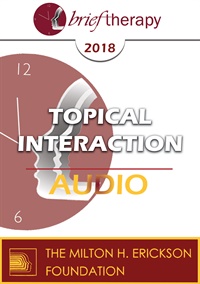BT18 Topical Interaction 11 - The Surprising Lessons Learned from Overcoming Depression: A Personal Story - Michele Weiner-Davis, MSW
- Average Rating:
- Not yet rated
- Topic Areas:
- Topical Interactions | Depression
- Categories:
- Brief Therapy Conference | Brief Therapy Conference 2018 | Pioneers in Couples and Family Therapy
- Faculty:
- Michele Weiner-Davis, LCSW
- Duration:
- 1:00:11
- Format:
- Audio Only
- Original Program Date:
- Dec 08, 2018
- License:
- Never Expires.
Description
Description: This presentation offers a candid exploration of personal experience with depression and its clinical implications. Drawing from her own journey, Weiner-Davis highlights the healing role of daily structure, supportive relationships, and meaning-making. The talk underscores the value of therapist self-disclosure, normalizing client experiences, and integrating empathy with clinical skill to foster connection and hope in treatment.
Syllabus Description: This presentation will allow for a dialog with attendees about the presenter's experience with overcoming depression and the important lessons learned for clinical practice in general.
Educational Objectives:
- Discuss the importance of the therapist-client relationship.
- Identify the reason hopefulness is essential.
- Describe two ways to avoid reifying hopelessness.
*Sessions may be edited for content and to preserve confidentiality*
Credits
Handouts
| Timestamped Transcript (826.6 KB) | 18 Pages | Available after Purchase |
| Ericksonian Learning Snapshot (250.3 KB) | 2 Pages | Available after Purchase |
Faculty

Michele Weiner-Davis, LCSW Related Seminars and Products
Michele Weiner-Davis, LCSW is the Founder of The Divorce Busting Center in Boulder, Colorado. She is a popular TEDx speaker and the author of eight books including, Healing From Infidelity, and the bestselling Divorce Busting and The Sex-Starved Marriage. She is the recipient of several prestigious awards including the Outstanding Contribution to Marriage and Family Therapy Award from AAMFT.


